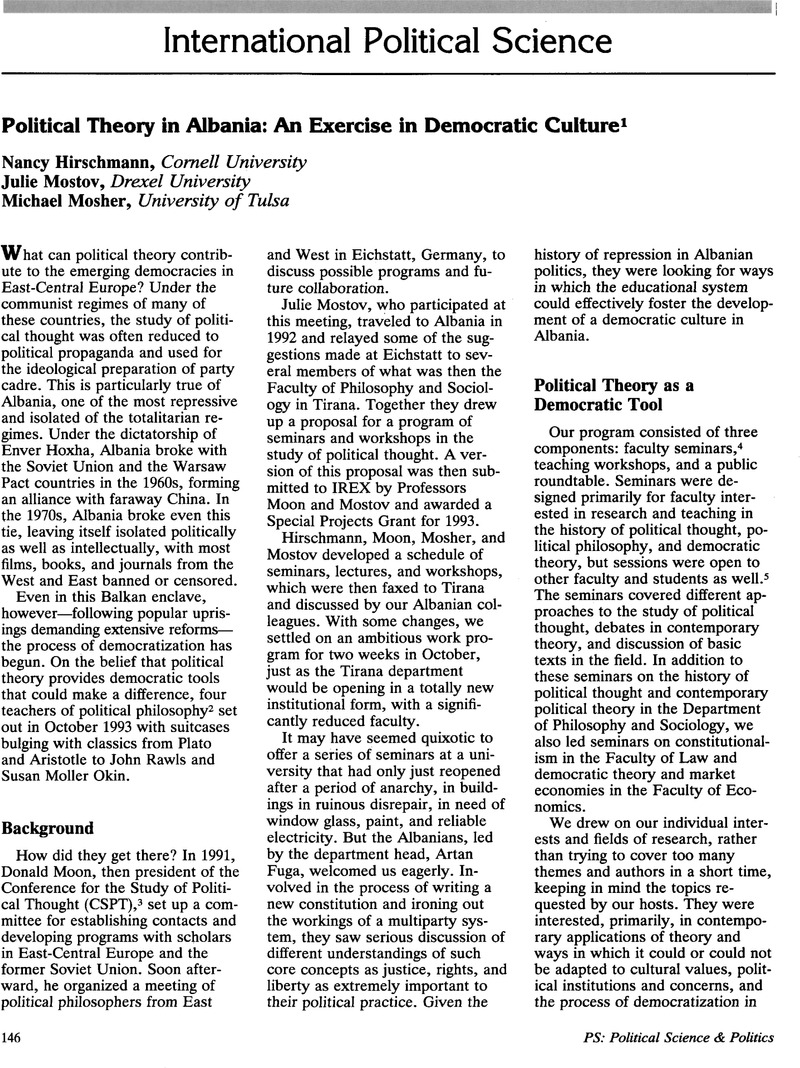No CrossRef data available.
Article contents
Political Theory in Albania: An Exercise in Democratic Culture
Published online by Cambridge University Press: 02 September 2013
Abstract

- Type
- News
- Information
- Copyright
- Copyright © The American Political Science Association 1995
Footnotes
This project was funded by a grant from the International Research and Exchanges Board (IREX), with funds provided by the U.S. Department of State (Title VIII) and the John D. and Catherine T. Mac-Arthur Foundation. None of these organizations is responsible for the views expressed.
References
Notes
2. The authors of this article, plus J. Donald Moon, Department of Government, Wesleyan University.
3. The Conference for the Study of Political Thought (CSPT) is an association of philosophers, political and social theorists, and other scholars in related fields, most of whom are engaged in university teaching and research. One of the aims of the CSPT is to encourage and develop the study of political thought and to facilitate exchanges among scholars doing research in related fields.
4. The Department of Philosophy and Sociology, in the Faculty of Social Sciences, was our host department, and the one we worked closely with on both our visits. At present, there is no department of political science or government.
5. Most of the Albanian professors spoke either English or French in our department. Seminars were held predominately in English, with French being a secondary resource. We used a translator in some of our classes in October, although a number of the students were proficient in English and/or French. We also used a translator for the public roundtables.
6. The books were purchased within the budget of the IREX grant or donated by the CSPT professors. Most of the works were in English, but a substantial number were in French, particularly those by French theorists. While faculty and students can read either or both of these languages, funding for translation of texts into Albanian is essential.
7. This topic was chosen by our hosts.
8. Reorganization left the department with only five full-time members and a few associate members (like adjunct faculty), most of whom were full-time faculty before a politically charged restructuring initiated by the government. Despite the tensions and drain on faculty resources this created, Dean Theodhori Karaj, Associate Dean Teuta Starova, and Fuga have been extremely resourceful in rebuilding the Social Science Faculty and Department of Philosophy and Sociology.
9. For example, Michael Mosher read a large section of Artan Fuga's dissertation, which Fuga is writing in Paris, and commented extensively on it. Mosher will return to Tirana some time in December, as part of our IREX/CSPT grant, for a week of seminars and discussions. Hirschmann received a request through Fuga from a group of women intellectuals who want to set up a feminist library. Hirschmann is trying to facilitate this through various women's networks, including the Women's Caucus for Political Science.




